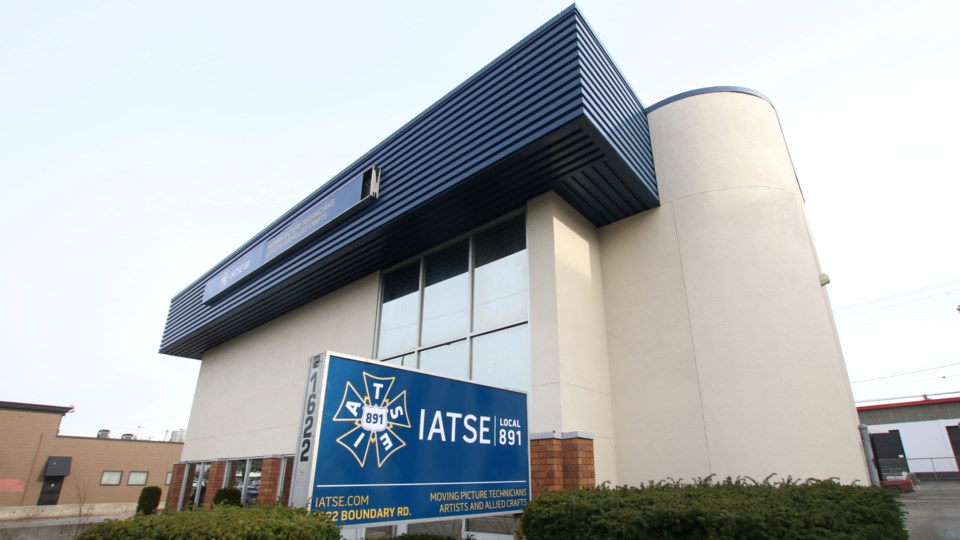Regulations in B.C.’s film and TV industry are keeping the threat artificial intelligence poses to job security at bay for now, but some creative sector unions are struggling with adoption and what it might mean for members.
From a screenwriting standpoint, the industry hasn’t yet experienced the full impact of AI, nor has the technology threatened the work of screenwriting professionals, said Writers Guild of Canada (WGC) Pacific-Western region councillor Jason Filiatrault.
This is in large part due to the efforts of unions such as the WGC to restrict the use of AI.
“We had an overwhelming supportive strike vote that almost pushed us towards labour action—partly to stand up against the use of AI in our industry,” he said. “We were definitely successful in that degree.”
Last May, the Writers Guild of Canada ratified a new three-year contract with the Canadian Media Producers Association (CMPA), increasing pay and protecting writers from AI.
These protections include producers having to disclose if they’re providing AI-generated materials for writers to work on, AI-generated material never receiving credit or compensation and the need to obtain consent to train AI with work from a screenwriter.
“We’re also talking with the government to ensure that there’s transparency in source material,” said Filiatrault. “Nobody should be able to illegally steal other people’s work and train an AI on it, and then go use that same AI to put people out of work. That’s nonsense.”
Aside from protections that slow AI’s adoption and restrict its use, computers’ inability to convincingly pretend to be a real person is another key reason why AI hasn’t significantly impacted the industry yet, said Filiatrault.
“AI screenwriting is not good writing, and we see it time and time again,” he said. “As a journalist, if ChatGPT tries to write the same story you do, it’s not going to do a good job.”
The lack of an economic gain by using AI is another factor, with Filiatrault adding that the use of the technology will not trigger significant savings for producers or for those looking to replace screenwriters. Work made by AI cannot be copyrighted, either, as it has no author.
“It’s not going to save you money—it’s going to do a worse job,” he said. “There are too many risks when it comes to AI and nobody’s going to use it to replace a screenwriter.”
Still, AI is gaining entry into different parts of the industry in ways both big and small, including visual effects and sound-mixing.
Filiatrault acknowledged the technology is becoming more prevalent, but questioned if the technology is getting better.
Replacing Canadian writers with AI to write Canadian stories without a sense of national identity, and using public funds to potentially put people out of work, also raise concerns, he said.
“I don’t think there is any advantage in AI going forward,” he said. “If people think they can save money, it’s going to get used, but ultimately it’s not going to be used well, and it’s not going to do good work.”
Many in the industry is dead set against the use of AI, with Filiatrault explaining there’s no value in a technology that takes away what makes life worth living.
“We want AI to do the mundane stuff so that we’re free to make art,” he said.
The International Alliance of Theatrical Stage Employees (IATSE) Local 891—a union of over 9,000 B.C. professionals in the film and TV industry—is seeking AI regulation, but also holds a different outlook.
“There isn’t a rejection of technology/AI by Motion Picture Unions and workers. Quite the opposite,” wrote the union’s business representative Crystal Braunwarth in an email.
Explaining the vast technological advancements made to the industry over the years—such as the transition of film to digital, and hand-drawn to computer generated—Braunwarth said the industry is masterful at adapting and adopting new techniques.
“We leverage technology so that it is human-centred, ensuring we and our work is applied in the most efficient, safe, innovative and creative ways possible,” she said.
With respect to AI, the union’s priority is to secure work, but they are also prepared to train members and meet employers at the table to find ways to fairly introduce technological change, Braunwarth said, adding that there is a need to put copyright protections in place to protect freelance workers.
IATSE Local 891 is currently in negotiations with the Alliance of Motion Picture and Television Producers (AMPTP) and the CMPA to ensure safeguards for the union’s “human-centred” approach to embracing AI and protecting jobs.
“We embrace tech, and it is possible to do that and protect the rights and lives of workers in the process without denying progress,” wrote Braunwarth.
BIV reached out to Screen BC, Creative BC, ICG Local 669, Thunderbird Entertainment and Big Time Decent Productions Inc. for comment but they either declined or did not respond.




